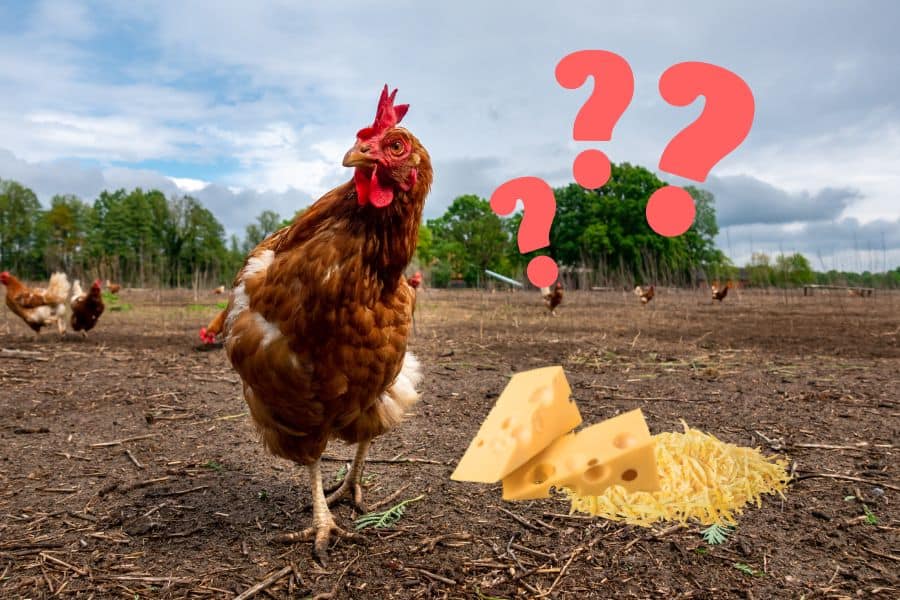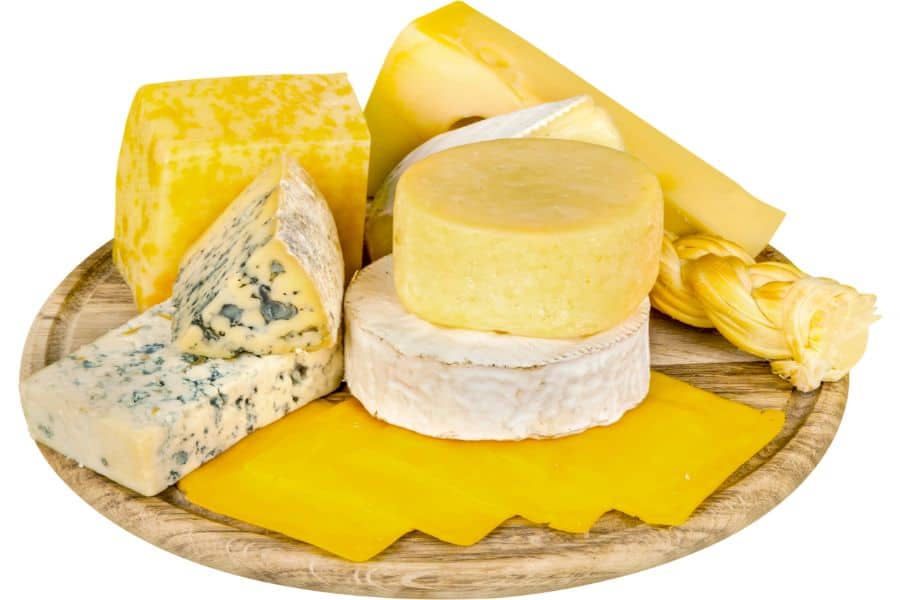Excess cheese is not a problem everyone is familiar with, but it has been known to occur. Whether it’s something left over on someone’s plate, or you just happen to produce more cheese than you know what to do with, you’ll still want to get the most out of these extras.
If you happen to keep chicken, you’ll know that these birds will make quick work of most table scraps. Chickens are very good at ensuring most of your leftover food won’t go to waste so you might be curious if this can also include cheese.
Chickens find cheese to be an absolute delight just like many humans. As luck would have it cheese can also be quite healthy for your chickens if fed to them in sensible proportions.
Join us as we take an in-depth look at the world of chicken and cheese.
What’s in Your Basic Cheese?
To understand why cheese can be so good for chicken, it’s important to first consider what’s in the cheese because not all cheese is created equal. The basic cheese in this case would be mozzarella because very little processing or aging is required to produce it.
Mozzarella is cheese at its most basic but is an excellent cheese to feed your chickens. According to the USDA, the main components of Mozzarella cheese are:
- Water: 7%
- Protein: 7%
- Fat: 8%
In addition to the above, this cheese also contains a long list of minerals, vitamins, and other nutrients. These nutrients include calcium, magnesium, iron, selenium, potassium, vitamin A, vitamin E, and vitamin K.
Of these known nutrients, there are none that are considered poisonous for your chicken in the amounts present in cheese. This makes cheese a nutrient-dense snack that is good for both you and your feathered friends.
How Healthy is Cheese for Your Chickens?
Like most things, moderation is something you must practice when feeding cheese to your chicken. Cheese has many nutrients that can help your chicken to grow strong and healthy such as calcium, and several vitamins but that’s not all it has.
Cheese also contains a lot of protein and fat which is good for your chickens to a certain extent. If the chicken consumes more nutrients than it can use up, it will be stored in the body as fat resulting in weight gain.
Weight gain is a problem in chickens because it can cause hens to lay fewer eggs. The eggs produced by the hens may also be large enough to cause a prolapse.
Eating too much cheese can also cause immediate digestive problems for your chickens.
Lactose is the main type of sugar that is present in milk and milk products like cheese. A high amount of lactose in a chicken’s diet is not good because this sugar can irritate the mucous membrane in the bird’s digestive system.
Therefore, as much as cheese is full of nutrients that can be very good for your chicken, you must limit the amount of cheese you feed them. This will ensure you don’t introduce new health problems to your flock.
Health Risks in Aged Cheeses
It is easy to assess the health benefits and risks associated with feeding chicken fresh cheese like mozzarella. However, for some farmers, the cheese that will be accessible may be an aged variety like parmesan or cheddar.
The composition of cheese that has been aged will be different from that of fresh cheese hence the difference in taste. This is because the substances that make up the cheese will change, and the moisture content will also reduce.
Salt is an important ingredient in the making of aged cheese because it’s used to flavor the cheese and prevents the growth of bacteria during aging.
Unfortunately, this also means that while 100g of fresh mozzarella only has 699mg of sodium, the same amount of grated parmesan will have around 1750mg of sodium. This higher sodium content is likely to be seen whenever salt is used in the aging process.
Too much salt in the diet of a chicken can result in a significant number of serious health issues and even death, especially in chicks. Therefore, if the cheese you have at hand is very salty, you should avoid feeding it to your chicken.
Apart from the issue of high sodium content, there isn’t any evidence that points to aged cheeses being nutritionally worse for chickens than fresh cheeses.
Avoid Feeding Chickens Highly Processed Cheese
Processed cheese is a term used to refer to products that contain cheese that has been mixed with other ingredients. These additional ingredients are used to improve specific qualities like consistency and flavor and include food dyes, emulsifiers, preservatives, salt, etc.
Some examples of processed cheeses include Cheez Whiz, Velveeta, and Kraft Singles American. These are all popular products that we eat so why are they not good for your chicken?
Highly processed cheeses not only have lower nutritional value, but they also have additional ingredients that may have negative health effects. This lower nutritive value means there is little benefit to feeding these to chickens, and some added risk compared to regular cheese.
Specific Health Benefits of Feeding Cheese to Chicken
Cheese is not only a healthy treat for your chickens, but they also love this dairy product almost as much as we do. Check out this pair of blue chicken taking on some bits of cheese.
However, it’s not enough to say that cheese is a healthy snack for your chickens. It’s important to know exactly how eating cheese can contribute to the growth of your flock.
Protein
Proteins are very important to the healthy growth of your chickens. Proteins make up many of the active compounds inside the body of the chicken and help with the growth of body tissues and the overall growth of the bird’s body.
Chickens require a lot of proteins in their food to stay healthy which means that the protein available in cheese can be a good addition to their diet.
Calcium
Without calcium in their diets your chickens will, unfortunately, be prone to a number of debilitating conditions. These include rickets and cage layer fatigue, and the quality of eggshells would also be affected.
Milk and its products such as cheese contain a significant amount of calcium which is good news for your birds.
Vitamins
Vitamins are an essential part of a chicken’s diet and usually, the vitamins chickens need have to be premixed into their feed to ensure they don’t go without. If you don’t feed your chickens using commercial feed, they can still get their vitamins from other sources.
Cheese can be a source of vitamins A, E, K, B-12, and B-6 for your chickens. Vitamin A helps both normal growth and reproduction in chicken, and vitamin B-6 aids in brain function and development, and also helps the production of norepinephrine and serotonin.
Selenium
You may not have heard of it, but selenium is very important to your chickens’ health, and they can get some amount of it in cheese. Selenium can help improve the production of eggs, and the quality of semen from roosters among other things.
Are Cheese Production Byproducts Safe for Chickens?
The process of making cheese can result in several byproducts including rinds and whey. Whey is the liquid that is left behind after milk has been transformed into cheese curds and it contains small amounts of protein, fat, calcium, and other nutrients found in cheese.
The rind is simply the outer layer that is formed as the cheese ripens. The rind will vary in consistency and can be hard or soft.
Both cheese rinds and whey are considered safe for chicken consumption. The rinds may be quite hard depending on the type of cheese so you should grate it or do something else to make it easier for your chickens to enjoy.
Since whey is a liquid, an easy way to get your birds to enjoy it is by soaking something else in the whey and feeding that to your flock. Cheesemaking can also have other byproducts such as cloth or wax, but these should not be fed to chicken.
How to Feed Cheese to Chicken
Throwing a block of hard cheese into the coop is not a good way of treating your chicken to cheese. Soft cheeses like mozzarella can be shredded by hand before feeding to the chicken while harder cheeses are best grated.
It may also be a good idea to mix the cheese in with some other feed in case your chickens aren’t too fond of it. Take note that large pieces of cheese can be a choking hazard.
Cheese is a Treat, not a Diet
As a chicken owner, the health of your chickens is one of the most important things to you. Alongside this, you’re probably eager to keep your flock as happy as possible so you may want to give them something tasty regularly.
Most cheeses are safe for chickens to eat, and their nutritional content means they have significant health benefits. However, the story does not end here and there is a need for moderation.
Just as with humans, a regular diet that is rich in cheese can have negative side effects including weight gain and diarrhea. Thus, cheese should only be an occasional treat for chickens.
Very salty cheeses and highly processed cheese products should be avoided even as occasional treats for your chickens. Salty cheeses have too much sodium while highly processed cheeses have little nutritional benefits.
Lastly, you will want to make it easy for your chickens to enjoy the cheese by shredding or grating the cheese into smaller bits. This can also keep them from choking on large pieces.


